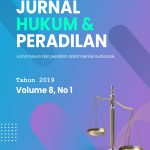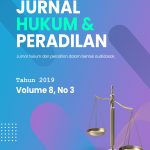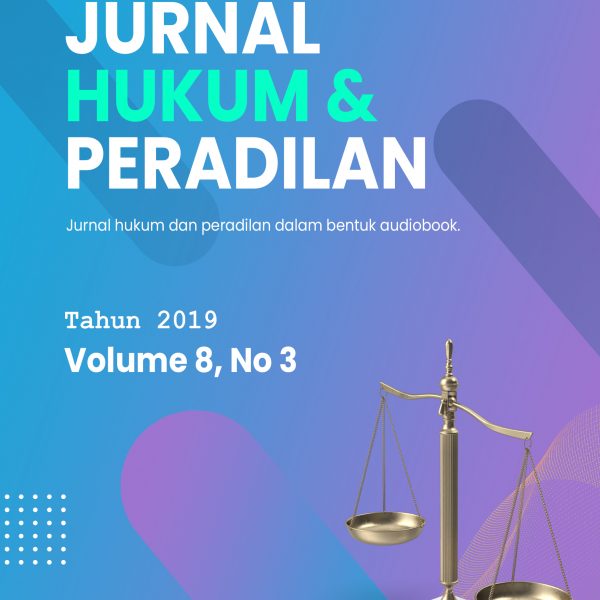
Jurnal Tahun 2019
Volume 8, No 2
Abstract.
Abstract.
Abstract.
The interpretation of judges in responding to the dynamics of renewal of Balinese inheritance customary law is very dynamic accompanied by the development of justice, especially towards the dimensions of kapurusa as heirs. Originally, kapurusa was only a descendant of men from a male family and adopted sons, and then it expanded to include male status, and eventually included women as heirs. Judges interpreted based on the development of modern law, progressive law, just law with a philosophical and juridical basis starting with the Decision of the MUDP Bali Supreme Court Number 01/KEP/PSM-3/MDP Bali/X/2010 concerning Supreme Court III MUDP Results Bali.
Abstract.
Abstract.
This paper aims to learn how the Qanun of Aceh, particularly Qanun No. 4 on Mukim and Qanun No. 5 on Gampong Government enforce Gampong as a government body. It further compares the hierarchical relationship between the qanun and the higher regulations in Indonesia such as Village Government Act No. 32 of 2004, Privileges of Aceh Act No. 44 of 1999, Special Autonomy No. 18 of 2001 and Aceh Government Act No. 11 of 2006. The study found that the Qanun integrates Acehnese identity coupled with the Islamic values into the Gampong institution. The Qanun on Gampong Government, in fact, does not negate any higher regulations in the Indonesian constitution. The principle of decentralization implemented post-Orde Baru requires a massive change in the government system in Indonesia from the centralized system of local state government, to local self-government and finally the decentralized system of the local community. The Qanun on Gampong government is in line with the local community spirit due to greater public participation channeled through Reusam Gampong. Reusam Gampong is the public aspiration, and its application shall not conflict with the higher regulation. In its cultural manifest, Resuam Gampong is an instrument that promotes the marriage between culture and religion into a single government body.
Abstract.
Abstract.
Legal disputes between entrepreneurs and consumers are currently caused by several things, one of which is the inclusion of an exoneration clause. The inclusion of the clause has clearly contradicted Law Number 9 of 1999 concerning Consumer Protection and has detrimental to the rights held by the Consumer. In addition, in terms of the Agreement Law, the entreprenurs that includes the exoneration clause clearly does not heed the principle of good intentions by utilizing the weak position of the consumer. The violation of the rights held by consumers, consumers can claim compensation and sue the entrepreneurs through various legal remedies. given by law. In this study also will discuss the legal consequences and legal efforts that can be submitted by the Consumer for the application of the Exoneration Clause in an agreement. The research method that will be used in this research is normative juridical, namely the approach using various data sources such as articles of legislation, various legal theories, and scientific works of scholars. The data used in this study comes from secondary data and tertiary data collected in accordance with the object written. After that, all legal materials that have been collected are inventoried and identified according to the problems that have been formulated. The conclusion of this study is to provide a legal understanding to consumers who are disadvantaged by the inclusion of an exoneration clause and provide advice in the form of legal remedies that can be taken.
Abstract.
This paper aims to reassess the term “elected democratically” in Article 18 (4) of Indonesia’s revised 1945 Constitution which resulted in the competing interpretation over the appropriate method for selecting heads of regional governments in Indonesia. In fact, the flexibility of such a term was challenged and negotiated to formulate an appropriate mechanism to select heads of regional governments. In 2004, the Constitutional Court concluded that the legislative body was the ultimate institution to interpret “elected democratically” so that this institution can opt whether a regional head election or an indirect election to define such a term. While the regional head election was applied, including its dispute settlements over electoral results to the Constitutional Court, this Court considered a different argument. In 2013, the Constitutional Court reinterpreted such an article by highlighting that the regional head election should be exempted from the general election subjected to Article 22E (2) of 1945 Constitution. In 2014, President Yudhoyono’s rejection from his agreement after the enactment of the Selection of Heads of Regional Governments Bill put further juridical contentions in which the President finally revoked the adoption of the regional head voting by the Regional People’s Representative Council or Dewan Perwakilan Rakyat Daerah (DPRD). As a consequence, the regional head election has been re-adopted and this regional election has remained to be expected to improve the performance of local democracy. The introduction of this direct election model at the regional level, however, questions the important role of political parties because the adoption of this election was substantially to answer public distrust against them. In particular, the debate whether political parties work becomes intense after non-party candidates are allowed to contest to this election.






